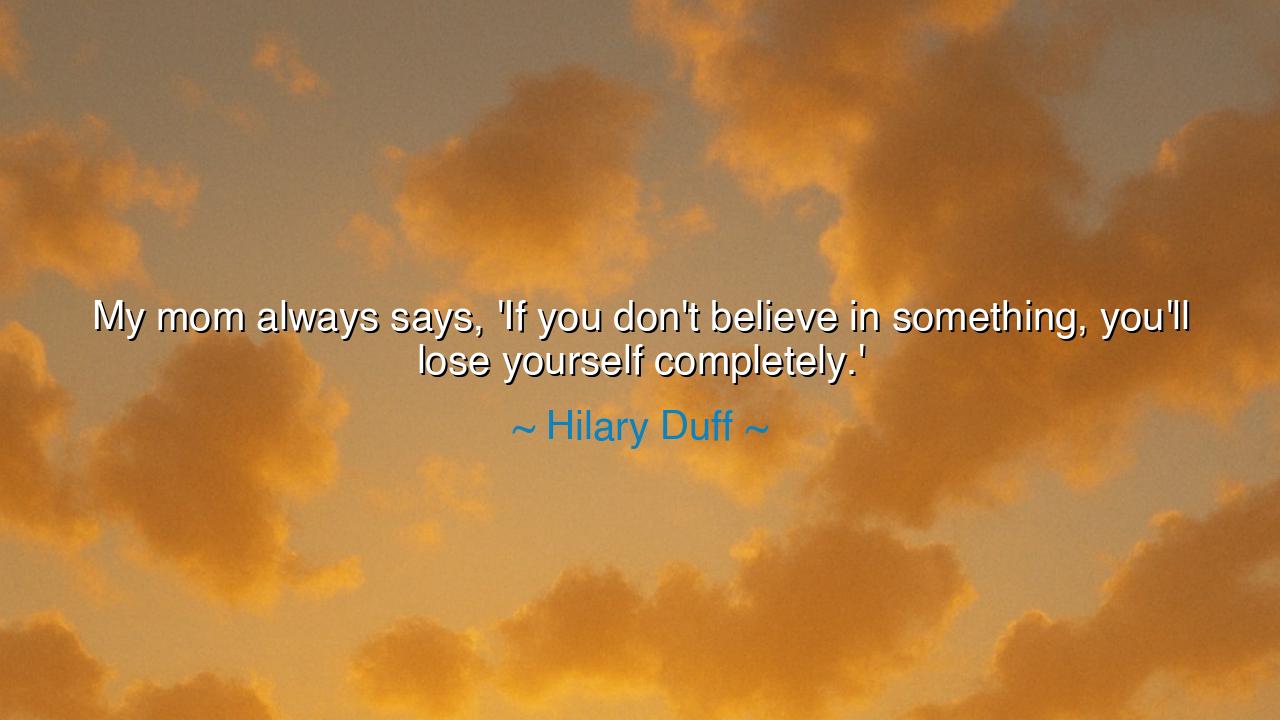
My mom always says, 'If you don't believe in something, you'll
My mom always says, 'If you don't believe in something, you'll lose yourself completely.'






“My mom always says, ‘If you don’t believe in something, you’ll lose yourself completely.’” — Hilary Duff
In these luminous words, Hilary Duff recalls the voice of her mother’s wisdom, a teaching that glows like an ember in the heart of every seeker. The phrase, “If you don’t believe in something, you’ll lose yourself completely,” speaks not merely of faith in a divine sense, but of the deeper conviction that anchors a soul amid the storms of life. It is a truth that the ancients themselves knew well — that without belief, without a core principle to hold fast to, the spirit drifts like a ship without a rudder, lost in a sea of uncertainty and distraction. Her mother’s counsel is not a gentle suggestion; it is a warning, tender yet profound: to live without belief is to vanish into the noise of the world.
The origin of this quote lies not in religion, but in the eternal human need for meaning. It comes from a mother who understood that conviction — whatever form it takes — is the essence of identity. The ancients would have likened such wisdom to that of the Delphic Oracle, whose inscription proclaimed, “Know thyself.” For to believe in something — a purpose, a virtue, a dream — is to know who you are, to draw a line between chaos and order. In a world that constantly seeks to shape us, belief is the flame that keeps the self from dissolving into darkness. Without it, even the strongest may falter; with it, even the humble may rise.
Consider, for a moment, the example of Joan of Arc, a young woman who lived centuries before Hilary Duff’s time, yet embodied the same truth her mother spoke. Surrounded by doubt, mocked by kings, and condemned by priests, Joan stood unbroken because she believed — fiercely, utterly — in her divine calling. They took from her her freedom, her name, and finally her life, but they could not take her faith, and thus they could not destroy her self. She perished in fire, but her belief turned her death into legend. The ancients would have called this immortal conviction — the strength that transcends the body and endures in spirit.
Yet belief does not always roar like a warrior’s cry. Sometimes it whispers, softly but steadfastly, in the heart of an artist, a parent, or a child. Hilary Duff’s mother, in her quiet teaching, reminds her daughter that even in the ordinary rhythm of life — in careers, relationships, and the daily struggle of being human — belief is the compass that prevents us from losing our way. Whether one’s belief rests in love, in art, in justice, or in the simple goodness of humanity, it gives direction. The ancients said that every soul must choose its “north star” — the fixed light by which all decisions and trials are measured. Without such a star, one wanders endlessly.
Her mother’s wisdom also carries a shadowed truth: the danger of losing oneself. To lose oneself is not merely to forget who you are — it is to become whatever others wish you to be. It is to trade your spirit for acceptance, your conviction for comfort. The ancients warned of this peril in their parables: of men who sought gold and forgot virtue, of rulers who gained kingdoms but lost their souls. The teaching is the same — if you do not believe in something greater than convenience or fear, the world will shape you into emptiness. Belief, then, is resistance; it is the refusal to be defined by the fleeting or the false.
The ancients revered belief as the highest act of courage. In the teachings of the Stoics, it was called logos, the principle of order and reason that gives life meaning. In the words of the mystics, it was faith — the invisible thread binding the human to the divine. In Hilary Duff’s mother’s voice, that same truth finds new form: belief as selfhood. To believe is not merely to hope; it is to stand upon the firm ground of your own heart, saying, “This is who I am, and this is what I stand for.” Every generation must rediscover this truth, or risk being swept away by the tides of confusion and fear.
Let this, then, be the lesson passed down: find what you believe in, and hold to it with all your heart. Do not wait for others to tell you what is worth believing; seek it, question it, refine it, and live by it. For belief is not blind obedience — it is the clear-eyed recognition of meaning. Choose your convictions as you would choose a foundation stone — tested, true, and strong enough to bear the weight of your life. In doing so, you will not be lost, no matter how far you travel or how dark the road becomes.
And so the mother’s words endure across time, echoing with the same quiet power as the wisdom of the ancients: “If you don’t believe in something, you’ll lose yourself completely.” For belief is the root of identity, the guardian of the soul, and the fire that lights the way home. Those who believe in nothing become as shadows — but those who believe, even in the smallest spark, carry within them the light that no darkness can extinguish.






AAdministratorAdministrator
Welcome, honored guests. Please leave a comment, we will respond soon